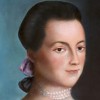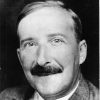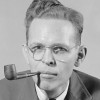The truth is I’ve never fooled anyone. I’ve let men sometimes fool themselves. Men sometimes didn’t bother to find out who and what I was. Instead they would invent a character for me. I wouldn’t argue with them. They were obviously loving somebody I wasn’t. When they found this out, they would blame me for disillusioning them — and fooling them.
Marilyn Monroe (1926-1962) American actress, sex symbol
My Story, ch. 24 “Another Love Affair Ends” (1974) [with Ben Hecht]
(Source)
Quotations about:
self-deception
Note not all quotations have been tagged, so Search may find additional quotes on this topic.
Many of our disappointments and much of our unhappiness arise from our forming false notions of things and persons. We strangely impose upon ourselves; we create a fairyland of happiness. Fancy is fruitful and promises fair, but, like the dog in the fable, we catch at a shadow, and when we find the disappointment, we are vexed, not with ourselves, who are really the imposters, but with the poor, innocent thing or person of whom we have formed such strange ideas.
Abigail Adams (1744-1818) American correspondent, First Lady (1797-1801)
Letter to Hannah Lincoln (5 Oct 1761)
(Source)
Illusion is the first of all pleasures.
[L’illusion est le premier plaisir.]
Voltaire (1694-1778) French writer [pseud. of Francois-Marie Arouet]
The Maid of Orleans [La Pucelle d’Orléans] (1756 ed.)
(Source)
Sometimes misattributed to Oscar Wilde. This is part of a canto added from another Voltaire piece, probably by a publisher, to the end of the 1756 edition of Voltaire's poem, as noted in the "Additional Notes" included with 19th Century editions of the work. It reads in part:
O gift from heaven! tender love! sweet desire!
We are still happy with your image:
Illusion is the first of all pleasures.
[O don du ciel! tendre amour! doux désir!
On est encore heureux par votre image;
L'illusion est le premier plaisir.]
The canto was not included the Voltaire-authorized 1762 edition. The English translation of the quoted line goes back at least to 1881.
More information: Illusion.
it is important not to confuse nationalism with mere worship of success. The nationalist does not go on the principle of simply ganging up with the strongest side. On the contrary, having picked his side, he persuades himself that it is the strongest, and is able to stick to his belief even when the facts are overwhelmingly against him. Nationalism is power-hunger tempered by self-deception. Every nationalist is capable of the most flagrant dishonesty, but he is also — since he is conscious of serving something bigger than himself — unshakably certain of being in the right.
George Orwell (1903-1950) English writer [pseud. of Eric Arthur Blair]
“Notes on Nationalism” (May 1945)
(Source)
The problem with evidence is it doesn’t always support your opinion.
Stephen Colbert (b. 1964) American political satirist, writer, comedian
Interview with Ron Suskind (13 Jul 2006)
(Source)
What stuck in the minds of these men who had become murderers was simply the notion of being involved in something historic, grandiose, unique (“a great task that occurs once in two thousand years”), which must therefore be difficult to bear. This was important, because the murderers were not sadists or killers by nature; on the contrary, a systematic effort was made to weed out all those who derived physical pleasure from what they did. […] Hence the problem was how to overcome not so much their conscience as the animal pity by which all normal men are affected in the presence of physical suffering. The trick used by Himmler — who apparently was rather strongly afflicted by these instinctive reactions himself — was very simple and probably very effective; it consisted in turning these instincts around, as it were, in directing them toward the self. So that instead of saying: What horrible things I did to people!, the murderers would be able to say: What horrible things I had to watch in the pursuance of my duties, how heavily the task weighed upon my shoulders!
Hannah Arendt (1906-1975) German-American philosopher, political theorist
Eichmann in Jerusalem: A Report on the Banality of Evil, ch. 6 (1963)
(Source)
Politics demands a great capacity for self-deception, which rescues the politician from hypocrisy. He can normally manage to believe what he is saying for the time it takes him to say it. This gives him a certain sincerity even when he is saying opposite things to opposite people.
Garry Wills (b. 1934) American author, journalist, historian
Confessions of a Conservative, ch. 15 (1979)
(Source)
It was not the absence of intelligence which led us into trouble but our unwillingness to draw unpleasant conclusions from it.
We lie to ourselves, in order that we may still have the excuse of ignorance, the alibi of stupidity and incomprehension, possessing which we can continue with a good conscience to commit and tolerate the most monstrous crimes.
I fear one lies more to one’s self than to anyone else.
We begin by fooling others and end up fooling ourselves.
Eric Alterman (b. 1960) American historian, journalist, author
Sound and Fury: The Washington Punditocracy and the Collapse of American Politics, Introduction (1992)
Alcohol is nicissary f’r a man so that now an’ thin he can have a good opinion iv himsilf, ondisturbed be th’ facts.
[Alcohol is necessary for a man so that now and then he can have a good opinion of himself, undisturbed by the facts.]
Propaganda does not deceive people; it merely helps them to deceive themselves.
Eric Hoffer (1902-1983) American writer, philosopher, longshoreman
The Passionate State of Mind, Aphorism 260 (1955)
(Source)
When we believe ourselves in possession of the only truth, we are likely to be indifferent to common everyday truths. Self-deception, credulity, and charlatanism are somehow linked together.
Eric Hoffer (1902-1983) American writer, philosopher, longshoreman
The Passionate State Of Mind, Aphorism 83 (1955)
(Source)
We lie loudest when we lie to ourselves.
Eric Hoffer (1902-1983) American writer, philosopher, longshoreman
The Passionate State of Mind, Aphorism 70 (1955)
(Source)
If we say we have no sin, we deceive ourselves, and the truth is not in us. If we confess our sins, he is faithful and just, and will forgive our sins and cleanse us from all unrighteousness.
The Bible (The New Testament) (AD 1st - 2nd C) Christian sacred scripture
1 John 1:8-9 [KJV (1611)]
(Source)
Alternate translations:
If we say we have no sin in us, we are deceiving ourselves and refusing to admit the truth; but if we acknowledge our sins, then God who is faithful and just will forgive our sins and purify us from everything that is wrong.
[Jerusalem (1966)]
If we say that we have no sin, we deceive ourselves, and there is no truth in us. But if we confess our sins to God, he will keep his promise and do what is right: he will forgive us our sins and purify us from all our wrongdoing.
[GNT (1976)]
If we say that we have no sin, we deceive ourselves, and the truth is not in us. If we confess our sins, he who is faithful and just will forgive us our sins and cleanse us from all unrighteousness.
[NRSV (1989)]
The world is so exquisite with so much love and moral depth, that there is no reason to deceive ourselves with pretty stories for which there’s little good evidence. Far better it seems to me, in our vulnerability, is to look death in the eye and to be grateful every day for the brief but magnificent opportunity that life provides.
Many would be wise if they did not think themselves wise.
[Serían sabios algunos si no creyesen que lo son.]
Baltasar Gracián y Morales (1601-1658) Spanish Jesuit priest, writer, philosopher
The Art of Worldly Wisdom [Oráculo Manual y Arte de Prudencia], § 176 (1647) [tr. Jacobs (1892)]
(Source)
(Source (Spanish)). Alternate translations:
Some would be wise, if they did not think themselves so.
[Flesher ed. (1685)]
Some would be wise if they did not believe themselves wise.
[tr. Fischer (1937)]
Some would be sages if they did not believe they were so already.
[tr. Maurer (1992)]
Don’t part with your illusions. When they are gone you may still exist, but you have ceased to live.
Mark Twain (1835-1910) American writer [pseud. of Samuel Clemens]
Following the Equator, ch. 59, epigram (1897)
(Source)






















